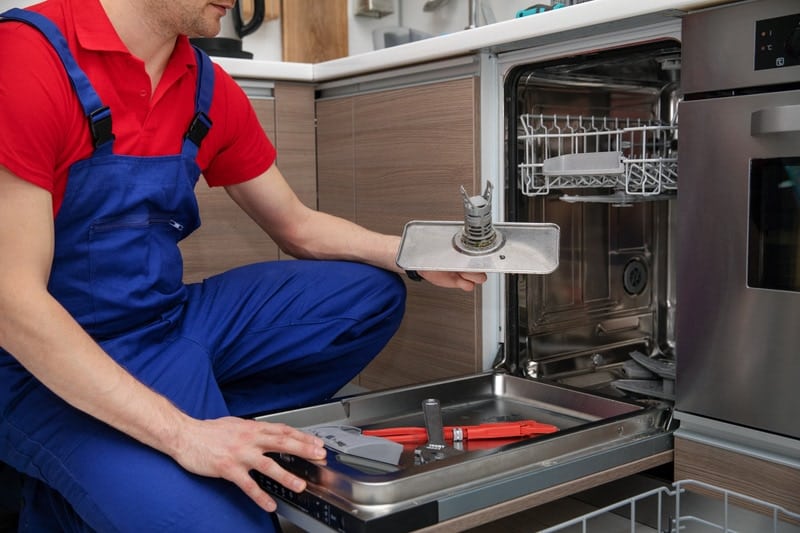How to Detect Issues with My Dishwasher: Useful Tips
How to Detect Issues with My Dishwasher: Useful Tips
Blog Article
Presented here down the page you might get more sensible information and facts about How to Troubleshoot & Repair a Dishwasher.
:strip_icc()/Save-water-running-dishwasher-d5637a54ecd4449d8f38dfb9238a6884.jpg)
Having your dishwasher breakdown or breakdown can be a big deal as well as trigger some discomfort in the house. Dishwashing machines are devices that we use to tidy dishes and flatwares immediately to save us the anxiety of manually doing it.
Like every other maker that alleviates human effort, dishwashers can break down and develop some fault at some point in time. There are numerous mistakes your dish washer can develop, and while a few of them can be resolved by replacing some parts or repairing them, other extra extreme problems will need that you obtain a new dishwasher.
This article will certainly identify a couple of typical mistakes your dishwasher can establish to prevent its general performance and also just how these faults can be solved.
Usual Faults
Usual dishwashing machine faults might vary from small to major ones. Relying on the degree, you will either require the solutions of professional plumbing technicians to deal with or replace it.
Some of one of the most common faults consist of:
Dripping Dishwashing machine
This is probably one of the most daily dishwasher trouble, as well as fortunately is that it is simple to recognize. Leakages occur as a result of a number of reasons, and also the leaks can ruin your cooking area. Usual causes of dish washer leakages include;
Bad-Smelling Dishwashing machine
This is one more usual dishwasher issue, as well as it is mostly brought on by food particles or oil sticking around in the device. In this instance, search for these fragments, take them out and also do the meals without any meals inside the device. Laundry the filter extensively. That will help do away with the bad scent. Guarantee that you eliminate every food fragment from your recipes prior to moving it to the equipment in the future.
Inability to Drain pipes
Often you might see a large amount of water left in your bathtub after a clean. That is possibly a water drainage issue. You can either check the drainpipe hose pipe for problems or clogs. When doubtful, speak to a professional to have it examined and also taken care of.
Does unclean appropriately
If your recipes and also flatwares come out of the dishwasher and still look unclean or unclean, your spray arms may be an issue. In most cases, the spray arms can obtain clogged, and it will certainly call for a quick clean or a replacement to function efficiently again.
Conclusion
Some of these typical dishwashing machine faults can be fixed quickly in the house, yet sometimes, the mistakes could be enormous and might need the interest of professionals. If you live in Rochester, Syracuse, and various other parts of America, let the professionals appropriately identify what could be wrong with your dishwashing machine and extend a service.
We also mount dishwashers if you just acquired a brand-new one or mean to change your own. With our years of experience in the sector, we are sure to provide you the best possible services.
Dishwasher Won’t Drain? 8 Steps to Fix It
Run the Disposal
A full garbage disposal or an air gap in a connecting hose can prevent water from properly draining out of the dishwasher. Simply running the disposal for about 30 seconds may fix the issue.
Check for Blockages
Check the bottom of the dishwasher to make sure that an item or pieces of food haven't fallen from the rack to block the water flow.
Load the Dishwasher Correctly
Make sure you’re loading the dishwasher correctly. Read the manufacturers’ instructions or owner’s manual for tips and directions on how to load dishes for best results.
Clean or Change the Filter
You may have a clogged dishwasher filter that’s preventing water from draining. Many homeowners don’t realize that dishwasher filters need to be cleaned regularly. Check your owner’s manual to see where the filter is located on your dishwasher, and for instructions on how and when to clean it. For many dishwashers, the filter can be found on the inside bottom of the appliance.
Inspect the Drain Hose
Check the drain hose connecting to the sink and garbage disposal. Straighten any kinks that you may see, which could be causing the problem. Blow through the hose or poke a wire hanger through to check for clogs. Make sure the hose seal is tight, too.
Try Vinegar and Baking Soda
Mix together about one cup each of baking soda and vinegar and pour the mixture into the standing water at the bottom of the dishwasher. Leave for about 20 minutes. If the water is draining or starting to drain at that time, rinse with hot water and then run the dishwasher’s rinse cycle. That may be enough to help loosen any clogs or debris that are preventing the dishwasher from draining properly.
Listen to Your Machine While It's Running
Listen to your dishwasher while it’s running a cycle. If it doesn’t make the usual operating sounds, particularly if it’s making a humming or clicking noise, the drain pump and motor may need replacing. If this occurs, it may be time to call a professional for help.
https://www.ahs.com/home-matters/repair-maintenance/how-to-fix-a-dishwasher-that-is-not-draining/

Do you enjoy reading up on How to Troubleshoot & Repair a Dishwasher? Put feedback directly below. We'd be pleased to listen to your ideas about this blog. We are looking forward that you come back again later on. Are you aware of another person who is occupied with the niche? Feel free to share it. Thank you for taking the time to read it.
Quick solution? Call. Report this page